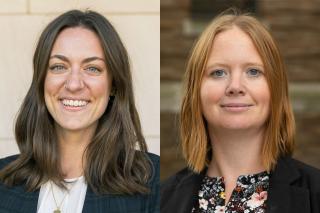Since its inception, Simmons University has attracted and shaped future leaders. "Students are drawn to Simmons because of our leadership brand but also because of the environment Simmons creates," says Julia Hvoslef, Director of the Jennifer Eckert Center for Leadership and Engagement. "Many students tell me that Simmons creates a safe space in which they can be themselves. Simmons fosters growth and self-knowledge, and understanding who you are is a gateway to being a good leader."
Dr. Meghan Doran, Director of Community Engagement, adds, "a lot of students do not initially see themselves as leaders, but they walk out of here as leaders." Simmons is aiming to change students' perception with a new initiative, the Everyday Leadership Co-Curricular Pathway Program.
This program stemmed from ideas that President Lynn Perry Wooten and Vice President of Student Affairs Dr. Renique Kersh generated about Simmons' signature leadership brand.
"The purpose is to create a co-curricular experience where students have the opportunity to connect what they are learning inside in the classroom with their experiences outside the classroom," explains Hvoslef.
To that end, the Pathway offers enriching opportunities for students outside the classroom. These may include an on or off-campus job, involvement within a student organization, an internship, or a leadership position such as a Resident Advisor. In other words, co-curricular experiences are not typically related to academic experiences. The key innovation is enabling curricular and co-curricular leadership experiences to inform one another.
"Simmons students are getting a lot of information about leadership in the classroom," says Doran. "We have a leadership course and there are many co-curricular experiences that foster leadership. This program is not so much about creating another experience for them, but rather threading those pieces together. We want them to see the big picture regarding how they are learning and developing as leaders. As such, they are now better able to craft their leadership identity."
With its unique design, this pathway will enhance students' own theory and practice of leadership. First-year students may choose from a variety of co-curricular opportunities, including being a Bonner Leader, or an Orientation Leader. For second-year students, experiential learning opportunities include clinicals, internships, service learning, and fieldwork. The pathway helps students develop a number of core competencies of everyday leadership: self-awareness, showcasing one's strengths, prioritizing wellbeing, focusing on inclusion and belonging, and cultivating healthy resilience.
Upon completion of the Everyday Leadership Co-Curricular Pathway Program, students will receive a formal recognition of their accomplishment. As Hvoslef explains, "one of our goals is to provide students with a leadership distinction when they complete the program. This is a certificate of sorts to acknowledge their leadership experiences, and you can put this on a resume so it is very transferable."
The pathway program is designed to facilitate the transition to employment beyond Simmons. "One of our other goals is to teach students how to better communicate their leadership skills," says Hvoself. "We want our students to be able to apply their leadership experience to employment and opportunities beyond Simmons. For instance, Simmons students may have learned teamwork, conflict resolution, and managerial skills, all of which constitute desired skills in the workplace. We want to help them build that bridge."
Dr. Doran underscored the importance of integrating curricular and co-curricular competencies. "Many of these students are leaders already, and we want to recognize that leadership. We also help them with development that gives them a cohesive leadership style. Bringing together curricular and co-curricular experiences, we are bringing together theory and practice."
Simmons' focus on everyday leadership contributes to a more nuanced vision of what leadership entails. "Leadership is an evolving practice," says Hvoslef. "It is not positional. It is more about showcasing your different strengths and utilizing them in different contexts. Leaders also invite others into conversations and listen to people."
Dr. Doran adds that "we are calling it everyday leadership in this pathway, and we are focused on this rather than positional leadership. We want to help students cultivate leadership in their everyday lives and connect this to their lifelong purpose."

